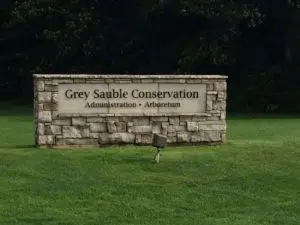The Grey Sauble Conservation Authority has sent a letter to Ontario Premier Doug Ford and his relevant ministers, pointing out some key concerns with regard to the recently passed Bill 23, the More Homes Built Faster Act.
They are concerned legislative changes could negatively impact rural Ontario, possibly increase risk to life and property for residents, increase costs and potentially delay approval timelines.
In the letter, the conservation authority notes that while they agree there is a housing supply and affordability issue in Ontario that needs to be addressed, it should be done in a practical way.
GSCA CAO Tim Lanthier says, “One of the things we’re really looking at is how does this affect the relationship between conservation authorities and our municipal partners,” adding, “When these changes came through and we see that they impact that relationsip with our municipal partners, it’s quite concerning for us and it should be quite concerning for the people of Ontario.”
The GSCA says Bill 23 could eliminate the agreements between conservation authorities and municipalities.
Lanthier says conservation authorities in Ontario are watershed-based in terms of their jurisdiction and their primary purpose is to provide planning comments to municipalities on natural hazards such as flood, erosion and dynamic beach. “The reason we do this is to ensure people and property are kept safe,” says Lanthier.
He notes GSCA also provides comments to the municipalities in its watershed related to natural heritage (wetlands, significant woodlands, significant valley lands, significant wildlife habitat).
Lanthier says, “We have eight municipalities in our region. We are able to, with a small suite of staff, provide this service to all eight municipalities, versus each of them having to hire these experts on themselves.”
He argues conservation authorities are well situated to do this because natural hazards and natural heritage tend to lie in the same areas. He notes conservation authorities have been providing those services for decades.
“Under the changes that Bill 23 just made, we will no longer be able to provide that service for a suite of pieces of legislation, a suite of acts, of which, they still need to be prescribed, but in the consultation guidance they gave examples and there was the Planning Act and the Niagara Escarpment Planning and Development Act, the Aggregate Resources Act, so every piece of legislation that we would essentially currently provide those comments on.”
Lanthier says, “Here’s where it becomes really important in a rural context, our local municipalities are not set up to have the expertise in-house to be able to look at those things. So what this is going to mean is either each of them has to hire on staff to do this, which is not really feasible, or they have to go to a consultant, or they have to find a different mechanism for setting up a collective like say, the counties to provide this service.”
The GSCA letter to the premier notes, this could result in increased financial and administrative burden to municipalities, may cause timeline delays, and will likely increase development costs.
Lanthier says Bill 23 can also exempt certain types and locations of development from the regulation process. To put it simply, if conservation authorities can’t comment on natural hazards, they believe it could negatively impact their ability to protect people and property from those risks.
The conservation authority also notes the Bill’s ability to implement a fee freeze could reduce service capacity, create delays and potential service interruptions, and possibly have long-term impacts to conservation authority businesses.
They’re also concerned with the provincial government’s potential to assess capacity of conservation authority owned land for residential development, noting in their letter, “conservation authority-owned lands were acquired for a number of reasons. The primary reasons for these acquisitions include for flood and erosion protection, as well as for the long-term securement of greenspace. Most of these lands, particularly in the Grey Sauble watershed, are not suitable or appropriate for development.”
The GSCA adds, they understand some conservation authorities have land they may want to divest of, but ask that specific specific parameters be applied to ensure the majority of conservation lands remain protected in perpetuity.
The Grey Sauble Conservation Authority also makes a recommendation in its letter that a provincial Conservation Authority Working Group (CAWG) continues. It was made up of representatives from conservation authorities, AMO, the development community, the province and the agricultural community. The GSCA says, “We strongly encourage the province to continue with this engagement to ensure that the decisions being made are the best decisions for Ontario.”




